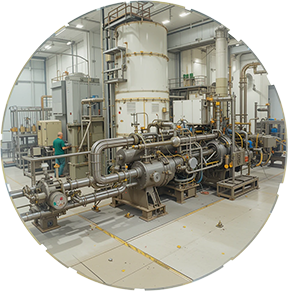Published: March 11, 2025 | Updated: October 21, 2025
Published: March 11, 2025 | Updated: October 21, 2025
How to Become a Hydraulics Technician: Skills, Training & Career Path
 Have you ever wondered what makes those giant construction machines move or how that fancy new arcade game delivers those intense force feedback effects? The answer lies in the power of hydraulics! But who keeps these amazing systems running smoothly? That's where the skilled professionals known as hydraulic technicians come in. This article will help you understand what hydraulic technicians do and how to become one yourself.
Have you ever wondered what makes those giant construction machines move or how that fancy new arcade game delivers those intense force feedback effects? The answer lies in the power of hydraulics! But who keeps these amazing systems running smoothly? That's where the skilled professionals known as hydraulic technicians come in. This article will help you understand what hydraulic technicians do and how to become one yourself.
What Does a Hydraulics Technician Do?
Think of them as the doctors for these powerful systems. Hydraulic technicians play a crucial role in keeping things running by:
Installation: They build and put together the intricate puzzle of pumps, valves, cylinders, and tubing that make up a hydraulic system.
Inspection and Maintenance: Just like taking your car for regular checkups, technicians perform routine inspections on these systems. They check fluid levels, examine hoses for leaks, and ensure everything functions optimally. The goal: prevent breakdowns before they happen.
Troubleshooting and Repair: Sometimes, things go wrong. When a system malfunctions, these technicians play the detectives. They diagnose the problem and fix it. They replace faulty components to ensure the system runs smoothly after repairs.
Limited Design and Testing: While not always the lead designers, these technicians can sometimes assist engineers by testing and evaluating new or modified equipment. They're like the pit crew for these high-powered systems, making sure everything performs flawlessly.
Collaboration: Teamwork makes the dream work! Technicians often work hand-in-hand with hydraulic engineers. Engineers might design the systems, while technicians handle the installation, maintenance, and troubleshooting. Companies need a combined effort to keep these machines running at peak performance.
How to Become a Hydraulics Technician
- Become a Math and Science Wiz: Hydraulics need an understanding of forces and how fluids behave. If still in high school, focus on advanced math and science courses. Physics and anything electrical will also come in handy. These subjects form a foundation for understanding how machines work and how forces interact.
- Consider an Associate's Degree: While not always mandatory, consider an Associate's Degree in Mechanical Engineering Technology, Industrial Maintenance, or a similar field. These programs typically offer courses in:
- Hydraulic principles.
- Mechanical components.
- Troubleshooting techniques. Bonus points if they include hands-on labs to get you working with these systems firsthand.
- Certifications Can Boost Your Resume: Organizations like the International Fluid Power Society (IFPS) offer certifications for hydraulic technicians. Earn a relevant certification, like Mobile Hydraulic Technician. This showcases your knowledge and skills to potential employers. These certifications usually involve passing exams and sometimes require meeting experience prerequisites.
Experience is King (or Queen)
Practical experience sets you above just the book-learning people. Look for internship or apprenticeship opportunities related to hydraulics. Working alongside seasoned technicians allows you to:
- Learn on the job from the best.
- Apply your classroom knowledge to real-world situations.
- Gain valuable hands-on experience troubleshooting and repairing these specialized systems.
Launching Your Hydraulics Technician Career
Once you have a combination of education, certifications, and practical experience, start working! Many entry-level positions involve working under the supervision of more experienced technicians. This provides an informative and practical way to solidify your knowledge base and gain even more hands-on experience.
Never Stop Learning
The world of hydraulics constantly changes and evolves, just like many other fields. Stay up-to-date with the latest advancements by attending industry workshops and conferences or taking online courses offered by organizations like the IFPS. Building a network of skilled technicians and professionals pays off with many benefits. Attend industry events, connect with people on LinkedIn, and join online forums to expand your network and gain valuable insights.
Sharpen Your Skills
Hydraulic technicians wear many hats. You need strong communication skills for:
- Explaining technical concepts clearly.
- Troubleshooting issues verbally.
- Writing detailed reports.
Safety First, Always!
Hydraulic systems operate under high pressure and can be dangerous if not handled properly. You need a thorough understanding of:
Discover how streamlined maintenance processes can elevate production. Learn more.
 The Future of Hydraulics: Industry Trends & Innovations
The Future of Hydraulics: Industry Trends & Innovations
The hydraulics industry constantly sees innovation to improve efficiency, minimize environmental impact, and embrace automation. The following shows a few exciting trends to watch:
- Energy Efficiency and Reliability: With rising energy costs, everyone looks to optimize efficiency. Companies turn to modern variable-speed motors in hydraulic systems. These adjust their power output based on actual demands, maximizing efficiency and saving energy.
- Minimizing Environmental Impact: Sustainability poses a major concern, and the hydraulics industry provides answers. Every day you see evidence of moving away from mineral-based oils and conventional seals. Instead, they opt for more eco-friendly alternatives. Advancements in hydraulic tank systems also aim to reduce overall oil usage.
- Smart Machines Take Over: Industry 4.0, the trend towards automation, is making its way into hydraulic systems as well. Companies are merging traditional, high-power hydraulics with intelligent electronic controls for more precise automation.
- The Internet of Things (IoT) also plays a role. Imagine pressure sensors in hydraulic tanks that provide remote diagnostics and improve system reliability!
How a CMMS Supports Hydraulics Technicians and Engineers
A computerized maintenance management system (CMMS) empowers technicians to work smarter, not harder. Let's dive into how a CMMS transforms the daily work of a hydraulic technician:
Proactive Maintenance: Staying Ahead of the Game
Forget reactive, fire-fighting maintenance. A CMMS allows hydraulic technicians to shift to a proactive approach. Imagine scheduling preventive maintenance on a critical hydraulic press using the CMMS. The system automatically generates reminders for tasks like:
- Checking hydraulic fluid levels and condition (using tools like a fluid analysis kit).
- Inspecting hoses and fittings for wear or leaks (looking for tell-tale signs like bulging or cracks, often aided by a borescope.
- Replacing filters (like inline or spin-on filters) at the optimal intervals. This minimizes unexpected downtime caused by component failures.
Technicians can use the CMMS to keep a record of equipment readings. This helps shape the preventive maintenance program.
Work Order Management: From Chaos to Control
Picture this: a hydraulic cylinder on a robotic arm starts leaking. Instead of scrambling for paperwork and tracking down the right technician, he logs the issue into the CMMS via a mobile device. The CMMS automatically assigns the work order to a qualified technician who has all the necessary information at their fingertips: the location of the equipment, the maintenance history of the cylinder (including past repairs and part replacements), schematics, and even safety procedures.
The technician can then use the CMMS to order necessary replacement parts, like seals or O-rings, directly from inventory, and update the work order status as he completes the repair. No more lost paperwork, miscommunication, or delays.
Inventory Management: Having the Right Parts, Right Now
A CMMS provides real-time visibility into inventory levels of crucial hydraulic components. Technicians can quickly check if they have the right size and type of hydraulic hose, a specific brand of quick-connect coupling, or the correct replacement pump in stock.
The CMMS can also be configured to automatically generate purchase orders when inventory levels dip below a predefined threshold. This helps prevent stockouts. This is particularly important for specialized components like proportional valves or servo valves, where delays risk extra costs.
Data Analysis and Reporting: Turning Data into Actionable Insights
CMMS tracks a wealth of data, from equipment performance and maintenance history to technician productivity and costs. Technicians and maintenance managers can use this data to identify trends, such as recurring failures on a specific type of hydraulic system.
For example, if the CMMS reveals that a certain brand of hydraulic hose is failing prematurely, technicians can investigate the cause and potentially switch to a more durable option. The CMMS can also generate reports on key metrics like mean time between failures (MTBF) and overall equipment effectiveness (OEE), providing valuable insights for optimizing maintenance strategies and improving system reliability.
Safety: A Top Priority
Hydraulic systems operate under high pressure and can be dangerous if not handled properly. A CMMS can store and track safety procedures for specific tasks, like working on pressurized lines or performing lockout/tagout procedures. Technicians can access these procedures directly through the CMMS. Work orders can have safety documents attached.
Why a Career as a Hydraulics Engineer is Worth Pursuing
The world of hydraulics needs skilled and passionate technicians to keep these powerful systems running smoothly. If you're fascinated by how machines work, enjoy troubleshooting challenges, and have a knack for learning, a career as a hydraulic technician could be a perfect fit. With the right education, experience, and a commitment to continuous learning, you can become a valuable asset in this ever-evolving field. So, are you ready to dive into the exciting world of hydraulics?
FAQs
What are the main responsibilities of a hydraulics technician?
Technicians are responsible for the installation, routine inspection, and maintenance of hydraulic systems, as well as troubleshooting and repairing faulty components when systems malfunction.
What foundational knowledge is needed to become a hydraulics technician?
A strong foundation in advanced math and science, especially physics and electrical subjects, is essential for understanding forces, fluid behavior, and how hydraulic machines operate.
Which certification is recommended to advance a hydraulics career?
Earning a relevant credential, such as the Mobile Hydraulic Technician certification from the International Fluid Power Society (IFPS), showcases specialized knowledge and skills to potential employers.
How does a CMMS help hydraulics technicians with preventive maintenance?
A CMMS allows technicians to proactively schedule tasks like checking fluid levels, inspecting hoses, and replacing filters, which helps minimize unexpected downtime and component failures.
What role does a CMMS play in hydraulics work order management?
A CMMS automatically assigns work orders, provides the technician with equipment history and schematics, and allows for real-time part ordering directly from inventory.
What are the emerging trends in the hydraulics industry?
Key industry trends include focusing on energy efficiency, minimizing environmental impact by using eco-friendly fluids, and integrating intelligent electronic controls for smart automation.
MAPCON | 800-922-4336
MAPCON CMMS software empowers you to plan and execute PM tasks flawlessly, thanks to its wealth of features and customizable options. Want to see it for yourself? Click the button below to get your FREE 30-day trial of MAPCON!
Try It FREE!